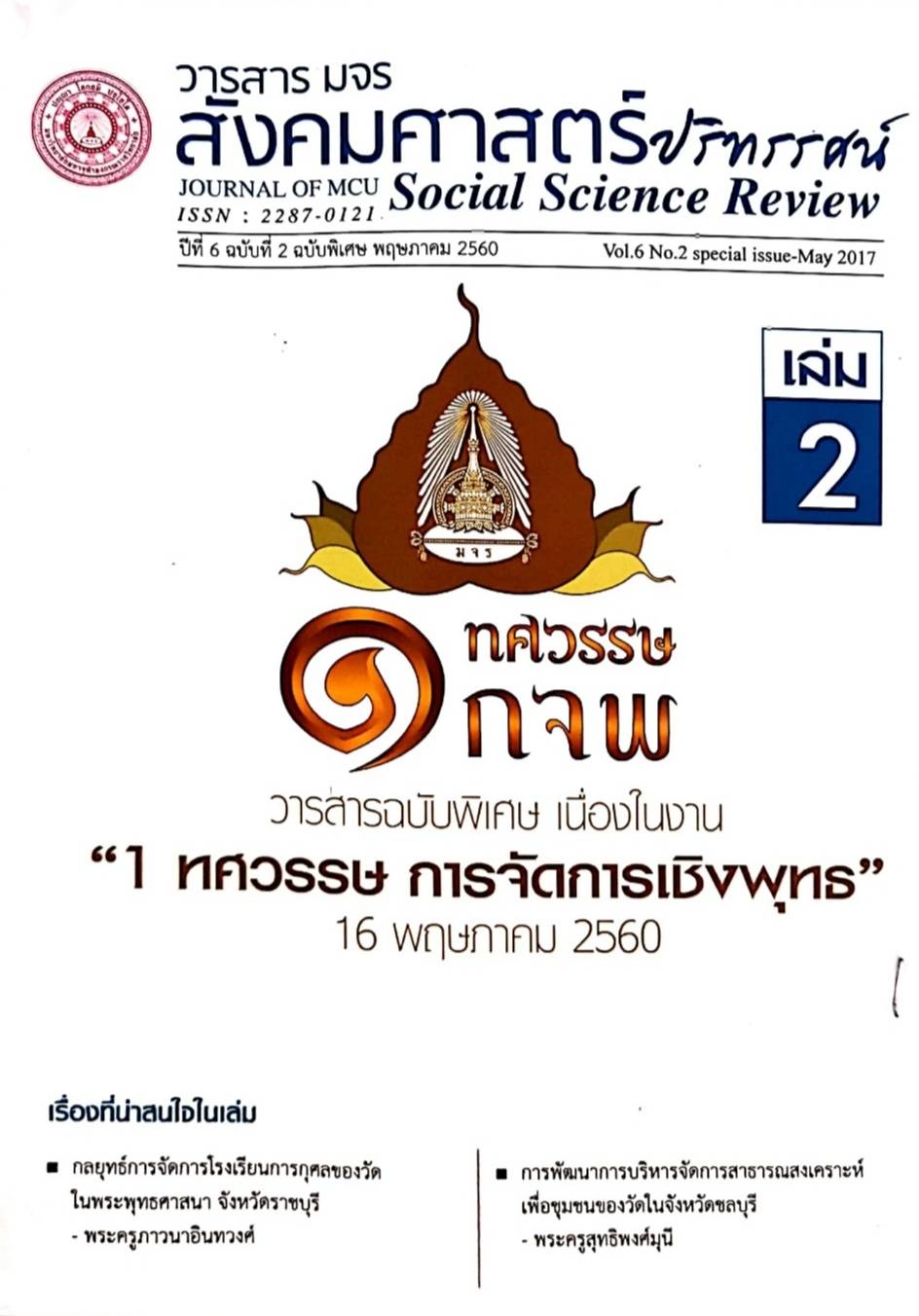ไทยแลนด์ 4.0 กับการปรับตัวของข้าราชการไทย
คำสำคัญ:
ไทยแลนด์ 4.0 ; ข้าราชการไทย ; การปรับตัวบทคัดย่อ
ยุทธศาสตร์ประเทศไทย 4.0 หรือไทยแลนด์ 4.0 เป็นโมเดลขับเคลื่อนประเทศไทยสู่ความมั่นคง มั่งคั่ง และยั่งยืน ซึ่งเป็นประเด็นที่มีความสนใจในการพัฒนาประเทศเป็นอย่างมากในปัจจุบันภาครัฐหรือระบบราชการในฐานะเป็นตัวละครสำคัญหรือกลไกหลักในการขับเคลื่อนเปลี่ยนแปลงดังกล่าว จึงต้องมีการปรับเปลี่ยนทั้งแนวคิดและวิธีการทางานใหม่ เพื่อให้สามารถบรรลุเป้าหมายในการพัฒนาประเทศดังนั้น บทความวิชาการนี้จึงมีวัตถุประสงค์เพื่อศึกษาแนวคิดเกี่ยวกับยุทธศาสตร์ประเทศไทย 4.0 หรือไทยแลนด์ 4.0 และระบบราชการไทยกับการปรับมุมมองและทัศนคติในการทางานซึ่งจะเป็นการวิเคราะห์ปัญหาและอุปสรรคในการทำงานของระบบราชการไทย และรวมทั้งการหาแนวทางแก้ไขและข้อเสนอแนะในการปรับตัวของข้าราชการไทยให้สอดรับกับการทำงานตามยุทธศาสตร์ประเทศไทย 4.0ผู้เขียนทาการศึกษาโดยการวิจัยเอกสารจากหนังสือ วารสารวิชาการ และเอกสารของหน่วยงานราชการที่เกี่ยวข้อง จากการศึกษาค้นพบว่า การปรับเปลี่ยนมุมมองและทัศนคติการทางานของข้าราชการไทยให้สอดรับกับการทางานตามยุทธศาสตร์ประเทศไทย 4.0 คือ การปรับเปลี่ยนค่านิยมการทางานของระบบราชการใหม่ เน้นกระบวนการพัฒนาฝึกอบรมผู้บริหารและฝ่ายปฏิบัติการทุกระดับ มีการติดตามและประเมินผลในการดาเนินงานภาครัฐอย่างต่อเนื่องปรับเปลี่ยนรูปแบบการทางานสู่รัฐบาลอิเล็กทรอนิกส์อย่างเต็มรูปแบบ การทางานโดยยึดประชาชนเป็นศูนย์กลาง การทางานที่เน้นการเชื่อมโยงและบูรณาการร่วมกันในการทางานของทุกภาคส่วนและการส่งเสริมให้ข้าราชการเกิดความคิดสร้างสรรค์และสร้างนวัตกรรมที่มีคุณค่าต่อการทำงาน
เอกสารอ้างอิง
เกียรติชัย ไชยศิริวัฒนะกุล . (2544). “อำนาจนิยมข้าราชการไทย: ศึกษาจากกทัศนคติของข้าราชการกระทรวงสาธารณะสุข” (วิทยานิพนธ์ศิลปศาสตรมหาบัณฑิต)กรุงเทพมหานคร: มหาวิทยาลัยเกษตรศาสตร์.
จุลศักดิ์ ชาญณรงค์. (2557). “วัฒนธรรมองค์การระบบราชการ ความเมตตา และคุณภาพชีวิตการทำงานของข้าราชการสังกัดกรุงเทพมหานคร” (รายงานผลการวิจัย ทุนอุดหนุนจากมหาวิทยาลัยธุรกิจบัณฑิตย์). กรุงเทพมหานคร: มหาวิทยาลัยธุรกิจบัณฑิตย์.
ซี. 12. (2560). (25 สิงหาคม 2560). ระบบราชการ 4.0. [ออนไลน์]. แหล่งที่มา :https://www.thairath.co.th/content/937990
ทศพร ศิริสัมพันธ์. (2560). (26 สิงหาคม 2560). ปฏิรูประบบราชการ ประตูสู่‘รัฐบาล 4.0’.ฐานเศรษฐกิจ. [ออนไลน์]. แหล่งที่มา : http://www.thansettakij.com/content
ทิพวรรณ หล่อสุวรรณรัตน์. (2555). e-Government รัฐบาลอิเล็กทรอนิกส์. กรุงเทพมหานคร:โรงพิมพ์แซท โฟร์ พริ้นติ้ง.
ธนิต โสรัตน์. (2559). (18 สิงหาคม 2560). การบรรยาย หัวข้อ ไทยแลนด์ 4.0 ต้องเริ่มปฏิรูประบบราชการ. วันที่ 19 ธันวาคม 2559. [ออนไลน์]. แหล่งที่มา :http://www.tanitsorat.com/file/%E%B9%84%E0%B8%97%E0%
ปาริฉัตร เข็มสุข. (2546). “ปัจจัยที่มีความสัมพันธ์กับความสาเร็จของแผนปฏิรูประบบบริหาร
ภาครัฐ: มุมมองของข้าราชการไทย” วิทยานิพนธ์ศิลปศาสตรมหาบัณฑิต.กรุงเทพมหานคร: มหาวิทยาลัยเกษตรศาสตร์.ผู้จัดการออนไลน์. 2560. (15 สิงหาคม 2560). Thailand 4.0 ข้าราชการไทย 0.4 และการศึกษาไทย 0.04 เราจะเริ่มฝันหรือทาฝันให้เป็นจริง. [ออนไลน์]. แหล่งที่มา :http://www.manager.co.th/Daily/ViewNews.aspx?NewsID=9600000076341
วิรัช วิรัชนิภาวรรณ. (2547). “ค่านิยมของข้าราชการไทยในอดีตถึงยุคปฏิรูประบบราชการ”วารสารสุโขทัยธรรมาธิราช. 17 (1), 22-37
ส.ค.ส. กองบริหารงานวิจัยและประกันคุณภาพการศึกษา. 2559. (10 สิงหาคม 2559). พิมพ์เขียวและแผนปฏิบัติการขับเคลื่อน: Thailand 4.0 โมเดลขับเคลื่อนประเทศไทยสู่ความมั่นคง มั่งคั่ง และยั่งยืน. [ออนไลน์]. แหล่งที่มา : www.libarts.up.ac. th/v2/img/Thailand-4.0.pdf
สถาบันพระปกเกล้า. 2560. (25 สิงหาคม 2560). การลดขั้นตอนการปฏิบัติงาน. [ออนไลน์].แหล่งที่มา : http://wiki.kpi.ac.th/index.php.
สมาพร ภูวิจิตร และคณะ. (2558). “รูปแบบวัฒนธรรมองค์การที่มีประสิทธิภาพ (The Effective Organizational Culture Model)” วารสาร วิทยาลัยนครราชสีมา. 9 (1), 73-77
สานักงานคณะกรรมการข้าราชการพลเรือน. (2560ก). (25 สิงหาคม 2560). ข้าราชการกับการขับเคลื่อนสู่ประเทศไทย 4.0. [ออนไลน์]. แหล่งที่มา : http://www.ocsc.go.th/blog/2017/05.
สำนักงานคณะกรรมการข้าราชการพลเรือน. 2560ข. (22 สิงหาคม 2560). ประเทศไทยในบริบทไทยแลนด์ 4.0 ภายใต้รัฐธรรมนูญแห่งราชอาณาจักรไทย พุทธศักราช 2560. [ออนไลน์].
แหล่งที่มา : http://www.ocsc.go.th/sites/deault/files/attachment/page/civil_officer_th_4.0.pdf
สานักงานคณะกรรมการข้าราชการพลเรือน. 2560ค. (8 มีนาคม 2560). นายกฯ ย้าข้าราชการต้องปรับความคิดให้ทันสมัย เป็นผู้นาการเปลี่ยนแปลงเป็นกุญแจสู่ประเทศไทย 4.0.[ออนไลน์]. แหล่งที่มา : http://www.ocsc.go.th/blog/2017.
สานักงานคณะกรรมการข้าราชการพลเรือน. 2560ง. (20 สิงหาคม 2560). ระบบราชการไทยในบริบทไทยแลนด์ 4.0. [ออนไลน์]. แหล่งที่มา: http://www.ocsc.go.th/sites/default/files/document/thai-gov-system-context-thailand-4-0.pdf
สิริกร สุขสุดไพศาล และกาญณ์ระวี อนันตอัครกุล. (2556). วัฒนธรรมองค์การและแรงจูงใจที่มีผลต่อประสิทธิภาพการทางานของข้าราชการพลเรือนในกรุงเทพมหานคร. วารสารบริหารธุรกิจศรีนครินทร์วิโรฒ. 4 (2),41-54สุวิทย์ เมษินทรีย์. 2560. ระบบราชการ 4.0. (18 สิงหาคม 2560) [ออนไลน์]. แหล่งที่มา:http://www.facebook.com/drsuvitpage/photos/pcb.
อรพรรณ ภักดีภักดิ์. (2549). “พฤติกรรมการปฏิบัติงานของข้าราชการไทย: ศึกษาเฉพาะกรณีสานักบริหารการทะเบียน กรมการปกครอง” สารนิพนธ์รัฐประศาสนศาสตรมหาบัณฑิต.
กรุงเทพมหานคร: มหาวิทยาลัยศรีนครินทรวิโรฒ.Denison, Daniel R. (1990). Corporate Culture and Organizational Effectiveness.New York: John Wiley & Sons.
ดาวน์โหลด
เผยแพร่แล้ว
รูปแบบการอ้างอิง
ฉบับ
ประเภทบทความ
สัญญาอนุญาต
ลิขสิทธิ์ (c) 2020 วารสาร มจร สังคมศาสตร์ปริทรรศน์

อนุญาตภายใต้เงื่อนไข Creative Commons Attribution-NonCommercial-NoDerivatives 4.0 International License.
เพื่อให้เป็นไปตามกฎหมายลิขสิทธิ์ ผู้นิพนธ์ทุกท่านต้องลงลายมือชื่อในแบบฟอร์มใบมอบลิขสิทธิ์บทความให้แก่วารสารฯ พร้อมกับบทความต้นฉบับที่ได้แก้ไขครั้งสุดท้าย นอกจากนี้ ผู้นิพนธ์ทุกท่านต้องยืนยันว่าบทความต้นฉบับที่ส่งมาตีพิมพ์นั้น ได้ส่งมาตีพิมพ์เฉพาะในวารสาร มจร สังคมศาสตร์ปริทรรศน์ เพียงแห่งเดียวเท่านั้น หากมีการใช้ภาพหรือตารางหรือเนื้อหาอื่นๆ ของผู้นิพนธ์อื่นที่ปรากฏในสิ่งตีพิมพ์อื่นมาแล้ว ผู้นิพนธ์ต้องขออนุญาตเจ้าของลิขสิทธิ์ก่อน พร้อมทั้งแสดงหนังสือที่ได้รับการยินยอมต่อบรรณาธิการ ก่อนที่บทความจะได้รับการตีพิมพ์ หากไม่เป็นไปตามข้อกำหนดเบื้องต้น ทางวารสารจะถอดบทความของท่านออกโดยไม่มีข้อยกเว้นใดๆ ทั้งสิ้น





